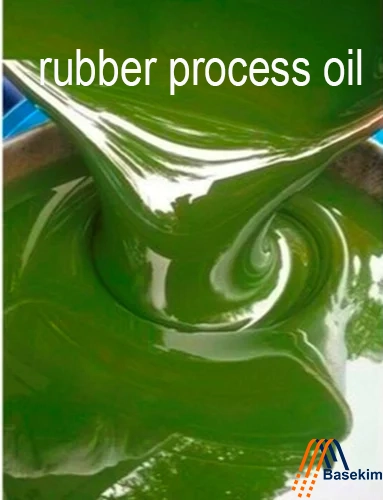
Why RPO for Rubber Compounding Matters: Basekim Leads the Way in Turkey and the UAE
Rubber products are everywhere—from tires and hoses to seals and insulation. Yet, most people don’t realize how much goes into making these everyday essentials. One of the most important ingredients is RPO for rubber compounding. Short for Rubber Process Oil, RPO ensures rubber is soft, flexible, and easy to shape.
If you’re a buyer or manufacturer in Turkey or the UAE, understanding the role of RPO could give you a competitive edge. In this guide, we’ll explain what RPO does, why it’s so important, and how Basekim, a leading supplier, supports the rubber industry with high-performance oils.
First, What Is RPO for Rubber Compounding?
To begin with, Rubber Process Oil is a type of oil added during rubber mixing. It acts as a softener and helps fillers blend more easily. Moreover, it improves workability and shortens processing time.
There are three main types of RPO:
-
Aromatic RPO – Best suited for synthetic rubber like SBR and offers excellent compatibility.
-
Paraffinic RPO – Known for stability and weather resistance.
-
Naphthenic RPO – Offers a balance between cost and performance.
While each oil type has unique features, all serve the same core purpose: improving how rubber performs during and after production.
Why Is RPO for Rubber Compounding So Important?
RPO plays a bigger role than many realize. It affects both the processing efficiency and the final product quality. For example, adding the right amount of rubber compounding oil can reduce mixing time and make rubber more elastic. Additionally, it improves surface finish and aging resistance.
Let’s look at more specific benefits:
-
Reduces friction during processing, making the rubber easier to mold.
-
Improves dispersion of fillers and additives.
-
Boosts tensile strength and elongation properties.
-
Lowers overall production cost, thanks to shorter cycle times.
As a result, high-quality RPO for rubber compounding can improve both profits and product reputation.
Where Is RPO Used in Manufacturing?
In reality, RPO is used across countless sectors. Most notably, it’s found in:
-
Tire manufacturing – It softens the rubber and helps with tread durability.
-
Industrial hoses and gaskets – Ensures flexibility and sealing performance.
-
Electrical insulation – Adds heat resistance and flexibility.
-
Conveyor belts and mats – Makes the rubber durable under stress.
Because RPO enhances both process flow and end-use performance, it’s vital in areas like the UAE, where extreme heat is common, or Turkey, where export standards demand high consistency.
Why Choose Basekim as Your RPO Supplier?
Choosing the right supplier is just as critical as choosing the right RPO type. That’s where Basekim stands out. With years of expertise and a strong track record, Basekim has become a trusted rubber processing oil supplier in Turkey, the UAE, and nearby regions.
Here’s why more manufacturers are turning to Basekim:
-
Custom formulation: Their team works with you to select the best RPO for your rubber formula.
-
Reliable logistics: Whether you’re ordering in bulk or need just-in-time delivery, they’ve got you covered.
-
Technical support: From testing to troubleshooting, Basekim helps you at every stage.
-
Eco-conscious options: They also offer low-PAH RPO to meet environmental regulations.
Not only does Basekim supply quality oil, but they also build long-term partnerships with manufacturers.
How to Select the Right RPO for Rubber Compounding
Even though RPO might seem like a basic component, selecting the wrong one can cause big problems. Fortunately, you can make smarter choices by considering the following:
-
Know your rubber type. For example, natural rubber and synthetic rubber react differently to oil.
-
Understand your product’s function. If it’s going to be used outdoors or in hot environments, you’ll need a heat-resistant RPO.
-
Compare oil compatibility. Not all RPO blends well with pigments and fillers.
-
Look for consistency. Quality oils provide uniform results and reduce batch failures.
In short, don’t guess—test. And work with a supplier like Basekim, who will guide you through the decision-making process.
Growing Demand for RPO in UAE and Turkey
As both countries push forward with industrial expansion, the demand for quality RPO for rubber compounding is rising. In the UAE, the construction and automotive sectors are booming, while Turkey continues to be a production and export hub for rubber products.
Because of this growth, there is no room for delays or substandard materials. Manufacturers in these regions need RPO that meets international performance and safety standards. That’s another reason why working with Basekim makes sense—they understand local market needs and deliver accordingly.
RPO and Environmental Responsibility
Nowadays, environmental impact is more than a buzzword—it’s a legal and ethical requirement. Luckily, modern suppliers like Basekim offer low-aromatic and environmentally friendly RPO options.
These alternatives are free from harmful polycyclic aromatic hydrocarbons (PAHs), making them safer for workers and cleaner for the planet. Consequently, using eco-safe RPO can help your brand stand out in both domestic and international markets.
Conclusion: Invest in Quality RPO for Long-Term Success
In summary, RPO for rubber compounding may not be the flashiest ingredient in your product formula, but it’s one of the most crucial. Whether you’re manufacturing in Turkey, supplying to clients in the UAE, or expanding globally, your rubber products deserve the best inputs.
Basekim has proven itself as a supplier that offers more than just oil—they provide peace of mind, performance, and partnership. Therefore, don’t settle for less when it comes to RPO.
